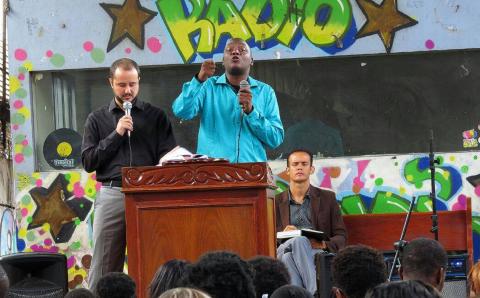Anyone paying attention to the budget of their Christian Reformed congregation knows that a substantial expense listed there is ministry shares. That is the amount that churches send to their local classis (regional group of churches) and to the denomination, to pay for ministries that the churches have together agreed to support.
Once called quotas, now renamed ministry shares, this system of collecting money from local congregations has been around for at least 100 years. Numerous reports over the decades have shown that it is the most efficient way to collect the money for shared ministry. John Bolt, director of finance and operations for the denomination, says that it takes $0.20 for every $100 collected in ministry shares. The additional amount needed to meet the budget takes $20 per $100 to raise.
However, many churches don’t pay all or any of their ministry shares. For fiscal year 2019, the ministry shares amount for adult professing members is set at $346.48. According to Bolt, if everyone paid their share, the denomination would receive around $38 million for shared ministry. In calendar year 2017, $22.7 million was collected, about 60 percent of the amount requested.
Making up a budget of millions based on hoped-for receipts is operating “on a wish and a prayer,” according to Bolt.
In 2016, delegates at synod, the annual leadership meeting of the CRC, asked the church’s administration to “reimagine” the ministry shares system. At the October 2018 meeting of the CRC’s Council of Delegates (which handles the business of the church between synods), delegates received the result of that study.
Under the current system, a denominational budget is drafted by staff, the annual synod approves a ministry shares amount, and a letter goes to the churches notifying them of that amount. The Reimagining Ministry Shares report proposes reversing that process by starting with what the churches pledge toward shared ministry and then making a budget based on that.
Under the new proposal, local church councils would be asked to consider their response to the ministry shares request for the following fiscal year. Then each classis would be instructed to take the time during fall meetings to “determine the best way to maximize the pledged support for denominational ministry.” That pledged support would be reported to the denominational offices by February 1 of the following year, and denominational budgets could then be drafted based on pledged income.
According to Bolt, this would align ministry shares commitment to the budget it supports and put churches at the beginning of the process. It also gets the classes more involved, he said. “Few classes have [this] conversation. That kind of conversation is important to have at every classis.”
Christopher DeWinter, Classis Niagara, said, “I’m not sure if what I see here is addressing the issue. We need to reimagine ministry. We need to wonder together, what does it mean to do mission.”
“The Church Order lays out how we do mission,” Bolt responded. “We have to do it together.” He said it doesn’t matter if the church is sending out a missionary for 30 years, or teaching locals to become pastors. The question is still, how are you going to pay for it?
Some delegates were in favor of the proposal. Brian L. Ochsner from Classis Central Plains said, “Our classis just went into the same model about three years, aligning pledge budgets and spending.”
Bruce DeKam, Classis Northern Michigan, agreed. “As business owner, I understand the necessity of having budgets that line up. It makes a tremendous amount of sense.”
One of the stumbling blocks for several delegates was moving the budget from the calendar year to the church’s fiscal year (July 1-June 30).
DeWinter said it seems to work against the posture of letting local churches set the course. “We’re asking our local churches to adjust to the denominational schedule. Most churches operate on a calendar year.” Aaltje van Grootheest, at-large delegate, agreed. “Why do you want us to adjust our budget process? Why don’t you adjust to us?”
Other delegates wondered how the new system will work for classes that meet only two times per year.
CRC executive director Steven Timmermans told delegates that the main shift is letting the local church and then the classis take the lead in making the commitment to ministry shares. “If we do that, we do need some logistical rearranging to do it in an orderly way. The system we have is top down. The posture shift is away from that.”
Sam Sutter, Classis Atlantic Northeast, was in favor of the report but was concerned about execution. “I want us to be very intentional sharing the vision with local churches.”
The Council agreed to propose the changes to Synod 2019 but with a one year delay. If adopted, churches and classes would be asked to discuss their ministry shares contributions in the fall of 2020, reporting pledged support to denominational offices by February 1, 2021, for the budget year starting July 1, 2021.
In an interview after the meeting, Bolt said, “We hope the churches in fact feel more empowered by making the pledge and therefore respond at a higher level to the suggested ministry shares.” If they don’t, he said they would have to think about reducing program. “Churches through synod tell us what ministry they want to do. If the money drops, you can make some of it up through individual donor gifts, but in reality, what the churches fund is really what they are passionate about doing,” he said. “What gets cut is the hard question.”
About the Author
Gayla Postma retired as news editor for The Banner in 2020.







